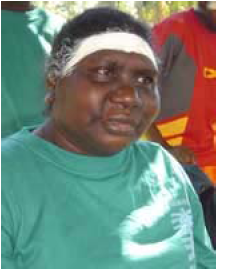Raymattja Marika (1959-2008) was a thinker, educator and elder of the Yolngu Community, North East Arnhemland, Australia. She has been principal of the Yirrkala School. Michael Christie is an Associate Professor of Linguistics at Charles Darwin University, Darwin, Australia. As Marika and Christie illustrate, ways of speaking and thinking about the world vary enormously across different languages and cultures, requiring appropriately varied educational responses.

The metaphors that Yolngu use for learning are quite different. Our school (Yirrkala Community School, Northeast Arnhemland, Australia) has been exploring the use of Aboriginal ways of making knowledge in the classroom. The school council is using community elders as consultants in developing Yolngu curriculum, which teaches the children Yolngu knowledge and Yolngu ways of knowing …
[One] word … that we often hear when Elders talk about education [is] ‘galtha’. ‘Galtha’ is a connecting spot. Sometimes a place can be seen as ‘galtha’. Recently, we have been learning about Dhalinybuy, the traditional homeland of some of our students … This is a place where people used to gather at certain times of year for sacred ceremonies and the collection of the cycad nuts and the preparation of sacred cycad bread. The people would sit in the galtha area … gathering together for a special collective purpose, negotiating together and getting ready for special activities together—maybe hunting, maybe ceremonies … When the discussion is finished, and people are happy about the plans that have been negotiated, a small but special ceremonial act is performed—‘galtha-ngurrkama’, throwing the ‘galtha’. Sometimes it is marked as a spear thrusting into the ground … When the ‘galtha has been thrown down, everyone knows the connection has been made, a decision has been agreed to, on once again how to bring the past into the present. We have decided on a plan, a way of going about creating something special and beautiful for ourselves …
‘Galtha’ is the name the community elders gave us for our Aboriginal curriculum in the school—a constant reminder that our knowledge comes from the context of our learning, and that we must negotiate an agreement about our perspectives if we are to produce significant knowledge.
Marika-Mununggiritj, Raymattja and Michael J. Christie. 1995. ‘Yolngu Metaphors for Learning.’ International Journal of the Sociology of Language 113:59–62. pp.59–60.
